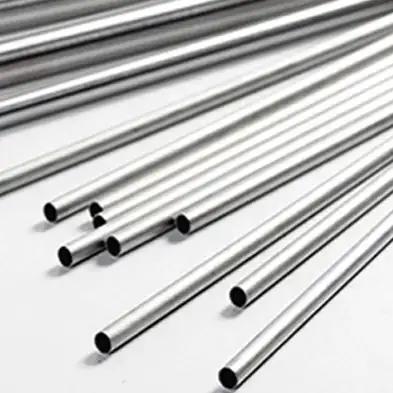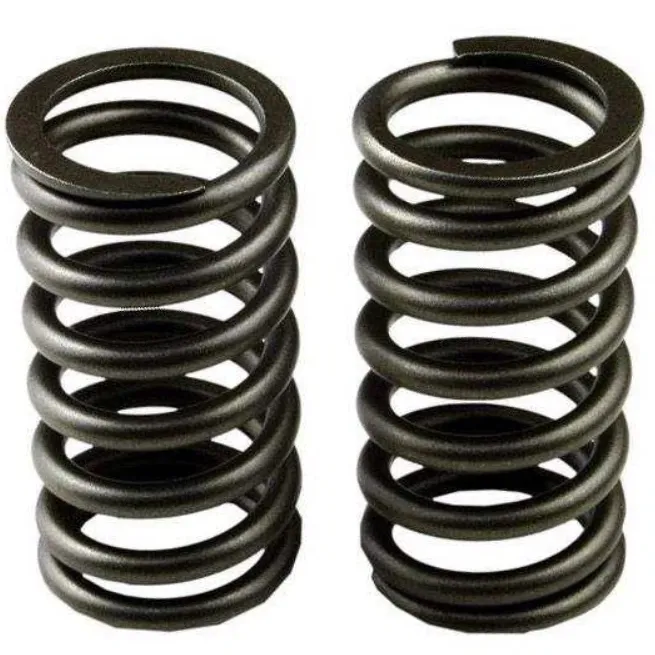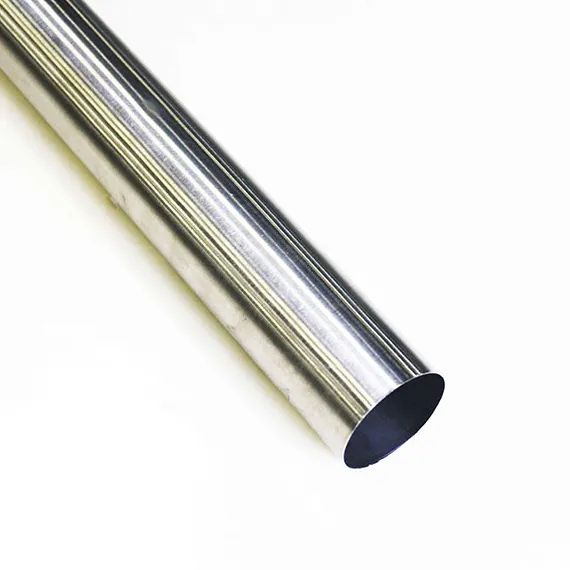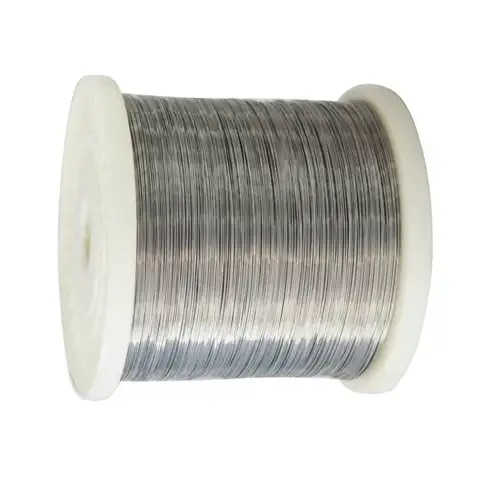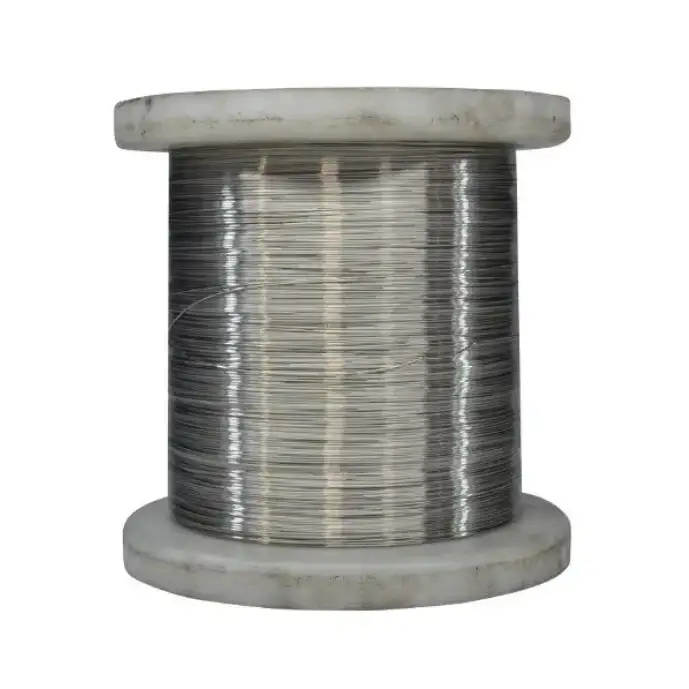Inconel® 600 tubing (UNS N06600) is a nickel-chromium-iron alloy tube engineered for high temperature strength and broad corrosion resistance; for applications where heat, oxidizing or reducing environments, and chloride stress-corrosion resistance matter, it outperforms standard austenitic stainless steels (for example 304) while trading off higher cost and more limited cold-formingability. For buyers seeking mill-certified material with rapid delivery and factory pricing, MWAlloys holds stock and ships Inconel 600 tube from China with full traceability and 100% factory pricing.
What is Inconel 600 tube?
Inconel 600 is a solid-solution nickel-chromium-iron alloy formulated for resistance to high-temperature oxidation and many corrosive media. In tube form it is supplied as seamless, welded, or coiled tubing and is used where long-term mechanical strength and oxidation resistance up to roughly 1,000–1,100°C (≈1,800–2,000°F) are required depending on environment and section size. The alloy is standardized under the UNS designation N06600 and commonly referenced by Werkstoff number 2.4816.
Material properties
Note: “Typical” values below come from mill datasheets and accepted handbooks; purchase specifications require mill certificates for acceptance tests.
| Property | Typical (annealed) |
|---|---|
| Density | 8.47 g/cm³ (0.306 lb/in³) |
| Tensile strength (UTS) | ~ 550–760 MPa (80–110 ksi) depending on condition. |
| Yield strength (0.2% offset) | ~ 200–450 MPa (varies with temp/condition). |
| Elongation (in 2") | 30–50% (annealed) |
| Hardness (B/Rockwell) | Approx. 70–95 HRB (annealed range) |
| Useful temperature range | Cryogenic up to ~1093°C (2000°F) in certain service conditions; practical continuous service typically <~1093°C. |
| Oxidation/corrosion | Excellent oxidizing-environment resistance; strong resistance to chloride-induced stress-corrosion cracking compared with many stainless grades. |
(Use these as guidance; always validate with supplier mill test reports for critical designs.)
Chemical composition (typical / allowable ranges)
The most commonly published composition bands for Inconel 600 / UNS N06600 are shown below. Percentages are weight %.
| Element | Typical / Spec range (%) |
|---|---|
| Nickel (Ni) | ≥ 72.0 |
| Chromium (Cr) | 14.0 – 17.0 |
| Iron (Fe) | 6.0 – 10.0 |
| Manganese (Mn) | ≤ 1.0 |
| Carbon (C) | ≤ 0.15 |
| Silicon (Si) | ≤ 0.5 |
| Copper (Cu) | ≤ 0.5 |
| Sulfur (S), Phosphorus (P) | Each ≤ 0.015 (typical) |
Applicable standards and typical tube specifications
Common tube/pipe specifications used for Inconel 600 tubing include (non-exhaustive):
-
ASTM B167 / ASME SB167 — Standard for nickel and nickel-alloy seamless pipes/tubes.
-
ASTM B163 / ASME SB163 — Seamless heat exchanger and condensers tube standards that are commonly referenced for nickel alloys in small diameters.
-
Other ASTM/ASME (B829, B444, SB444 etc.) and customer-specific mill orders may also be used depending on finish and testing.
Typical inventory forms and tolerances:
-
Nominal ODs: capillary sizes (≤1/8") up to larger heat-exchanger and process tube sizes (several inches). Supplier stock commonly covers OD 0.125"–4" (0.125–4.0 in), with schedule wall thicknesses Sch 5 to Sch 80 and custom wall thickness for coiled tubing.
Equivalent grades and cross-references
-
UNS: N06600.
-
DIN / Werkstoff: 2.4816 (common European identifier).
-
Other naming conventions (e.g., Chinese or Russian standards) appear in supplier cross-reference tables — always verify with the mill test certificate.
Dimensions & common sizes
Below is a compact size/weight comparison for frequently stocked tube sizes. Weights are approximate and shown per foot (imperial). Use mill tables for precise design.
| OD (in) | Wall (in) | Schedule equivalent | Approx. weight/ft (lb/ft) | Common use |
|---|---|---|---|---|
| 0.125″ | 0.035″ | thin capillary | 0.03 | Instrumentation, thermocouples |
| 0.250″ | 0.035″ | Sch 10 | 0.08 | Heat-exchanger small coils |
| 0.500″ | 0.083″ | Sch 40 | 0.35 | Process tubing, small lines |
| 1.000″ | 0.133″ | Sch 40 | 1.05 | Small process piping |
| 2.000″ | 0.218″ | Sch 40 | 3.95 | Heat exchangers, larger process lines |
(For metric sizes and coil tubing, suppliers publish detailed OD × wall × weight tables — always request the mill’s dimensional certificate.)
Is Inconel 600 better than SS 304?
Short answer: It depends on the duty.
-
High-temperature strength & oxidation: Inconel 600 retains strength at temperatures where 304 softens; therefore Inconel is the correct choice for sustained elevated-temperature applications.
-
Chloride / stress-corrosion cracking: In many chloride-containing or caustic environments Inconel 600 shows superior resistance compared with 304.
-
Cost & fabricability: 304 is far less expensive, easier to cold-form and weld for general fabrication. If service temperatures and aggressive chemistries are not present, 304 is usually the economical choice.
Designers choose Inconel when environmental or temperature demands exceed what stainless steels can reliably provide; otherwise 304 is preferred for cost efficiency.
Manufacturing, welding and heat treatment notes
-
Forms supplied: seamless tube (cold drawn or hot-finished), welded tube (ERW, EFW) and coiled capillary tubing.
-
Welding: Inconel 600 welds readily with matching nickel-base filler alloys; pre/post-weld heat treatment depends on assembly and service (consult filler spec and code).
-
Workability: Cold work elevates strength but reduces ductility; hot-working is required above certain reductions. Avoid aggressive cold forming without supplier consultation.
-
Heat treatment: Typical annealing cycles are used to restore ductility after cold deformation; follow mill guidance for temperatures and cooling rates.
Typical applications
-
Heat-exchanger tubes and coils for petrochemical & chemical processes.
-
Furnace elements and metallurgy components exposed to oxidizing atmospheres.
-
Nuclear steam generator and reactor components (where specific grades and certifications are met).
-
Downhole oil & gas tools where combined temperature and corrosives exist.
Global price snapshot 2025
Market prices for nickel alloys are volatile and vary by form, quantity, mill, and country. The table below aggregates public supplier price indications and market summaries (converted to USD per kg for easy comparison). Always request a firm quote (mill-certified) for purchase decisions.
| Region / market | Representative 2025 range (USD / kg) | Notes / source |
|---|---|---|
| China domestic (small orders) | $40 – $90 / kg | Inconel alloys typically quoted in this band from Chinese mills and distributors. |
| India / South Asia | $45 – $85 / kg | Local distributor quotes and import rates; fitting/fabrication raises landed cost. |
| Europe / US (small qty) | $60 – $120 / kg | Higher due to logistics and smaller order sizes; specialty suppliers list higher tagged prices. |
| Coil / thin tubing (capillary) | Varies; often higher $/kg | Small-diameter precision tube has processing premium. |
Important: these are indicative ranges consolidated from public price pages and supplier listings in 2025. Final cost depends on lot size, mill provenance, test certificates (EN/ASTM), surface finish, and additional processing. Request a formal quotation from your supplier.
Procurement checklist
-
Mill Test Certificate (MTC / EN 10204 3.1 or 3.2) — verify chemical & mechanical.
-
Traceability — furnace and heat numbers tied to certificate.
-
Specification — ASTM/ASME standard called out (e.g., ASTM B167 / ASME SB167).
-
NDT / testing — eddy current, hydro, hardness, grain size, or others per contract.
-
Surface finish & packaging — specify if oiling, seam orientation, or coiled packaging is needed.
-
Lead time & stock confirmation — ask for available heat numbers in stock and photographs of marking.
-
Warranty / acceptance plan — define acceptance tests and rejection thresholds.
MWAlloys offering: MWAlloys supplies Inconel 600 tube from China with ready stock, guaranteed mill origin, and 100% factory price for volume buys; typical lead times are short for stocked items and full MTCs are provided with shipments.
FAQs
-
What is UNS N06600?
The UNS designation for Inconel Alloy 600; used to unambiguously identify chemical and mechanical requirements. -
Can Inconel 600 be welded to stainless steel?
Yes — with appropriate nickel-base filler and procedures; avoid dissimilar metal corrosion effects and follow code guidance. -
Is Inconel 600 magnetic?
Generally non-magnetic in the annealed condition. -
What standard governs seamless Inconel 600 tubing?
Commonly ASTM B167 / ASME SB167 for seamless nickel alloy tubes; other standards (B163 etc.) may apply to heat-exchanger tubing. -
How does cost compare to 304 stainless?
Inconel 600 is substantially more expensive per kg; the premium is justified by higher temp and corrosive resistance. -
Are there direct equivalents to Inconel 600?
Equivalent identifiers include 2.4816 (Werkstoff) and UNS N06600; other trade names may exist. -
What are common failure modes?
High-temperature creep for poorly designed thin sections, localized corrosion from incompatible environments, or fabrication damage. Proper design and QA reduce risk. -
Can Inconel 600 be annealed?
Yes, annealing restores ductility; follow mill or code heating cycles. -
Is Inconel 600 suitable for seawater?
It has good resistance to many marine environments, but local conditions (biofouling, crevice corrosion) and cost must be evaluated; for severe chloride environments, higher-nickel or molybdenum alloys (e.g., 625, 718, or duplex stainless) are sometimes preferred. -
How to order to ensure quality?
Specify UNS N06600, desired ASTM/ASME spec, required tests (MTC), NDT, and finish; request photos and heat numbers before shipment.
Procurement example — MWAlloys quick offer
-
Product: Inconel 600 tubing (UNS N06600), available in seamless/welded/coiled formats.
-
Quality docs: EN 10204 / ASTM MTC provided.
-
Stock & lead time: Many common sizes held in China stock — instant shipping options for stocked heat numbers.
-
Price: Competitive factory pricing (see procurement table above for indicative ranges). Formal quote provided on RFQ.
-
Why MWAlloys: mill relationships, transparent traceability, and B2B terms tailored for global buyers.
Design cautions & best practice
-
Use correct design temperature for tensile/creep values; material charts and vendor data sheets differ with heat treatment.
-
For cyclic thermal service, check fatigue and thermal expansion compatibility with joined materials.
-
Avoid cold bending beyond supplier recommendations — small-diameter tube and thin walls are especially sensitive.
-
For welded assemblies, select compatible filler metals and post-weld procedures per code and service.

